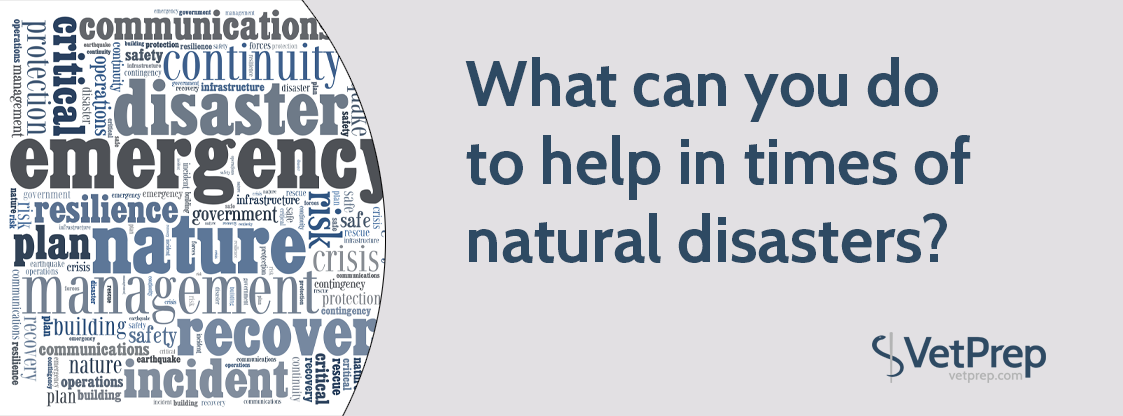
In light of the several natural disasters that have affected the U.S. in the past year, you may be wondering what you can do to help.
There are many ways, options and opportunities to help- the key, if you are passionate about and interested in disaster response, is to review the resources available and decide what way or ways you want to help!
1.Educate pet owners
As veterinary experts, we can help pet owners by sharing valid information about disaster preparedness and emergency planning. Articles such as “Disaster Preparedness” from the ASPCA will provide good information to pet owners so they can prepare and keep their pets as safe as possible during disasters.
2. Take animal emergency response courses
FEMA offers several incident management courses that can help you learn more about emergency planning. By taking courses and becoming certified, you may be able to volunteer and respond to disasters. There are many other ways to learn more about disaster response-check out this link to see other options for training opportunities.
3. Volunteer or Donate
The American Veterinary Medical Foundation(AVMF), a part of the AVMA, accepts donations that can be applied to help animals in disaster relief situations. Additionally, if you are providing emergency veterinary services to animal victims of disaster, you may qualify for grants from the AVMF. More information can be found at the AVMA.org website.
Additionally, there are many other organizations you can donate to or volunteer with- from response teams associated with universities, to state veterinary response teams and with organizations such as the Humane Society of the United States and others, there are so many opportunities to help in emergency situations.
4. Prepare yourself and your practice
After a crisis, it is likely that you may experience several stressful cases and situations. Preparing yourself and your practice to be able to help pets is important. A great resource on this topic is the article “In Time of Need: Veterinary Practices and Natural Disaster Preparedness.”
After exploring these resources and more, let us know if you have other suggestions to share!
References:
-
“Disaster Preparedness.” ASPCA. Retrieved from https://www.aspca.org/pet-care/general-pet-care/disaster-preparedness
-
“Disaster Response Training.” ASPCAPro. Retrieved from https://www.aspcapro.org/resource/disaster-cruelty-disaster-response/disaster-response-training
-
“Disaster Aid for Veterinarians.” AVMA. Retrieved from https://www.avma.org/KB/Resources/Reference/disaster/Pages/disaster-aid-veterinarians.aspx
-
“In Time of Need: Veterinary Practices and Natural Disaster Preparedness.” American Veterinarian. Retrieved from https://www.americanveterinarian.com/journals/amvet/2018/may2018/in-time-of-need-veterinary-practices-and-natural-disaster-preparedness


